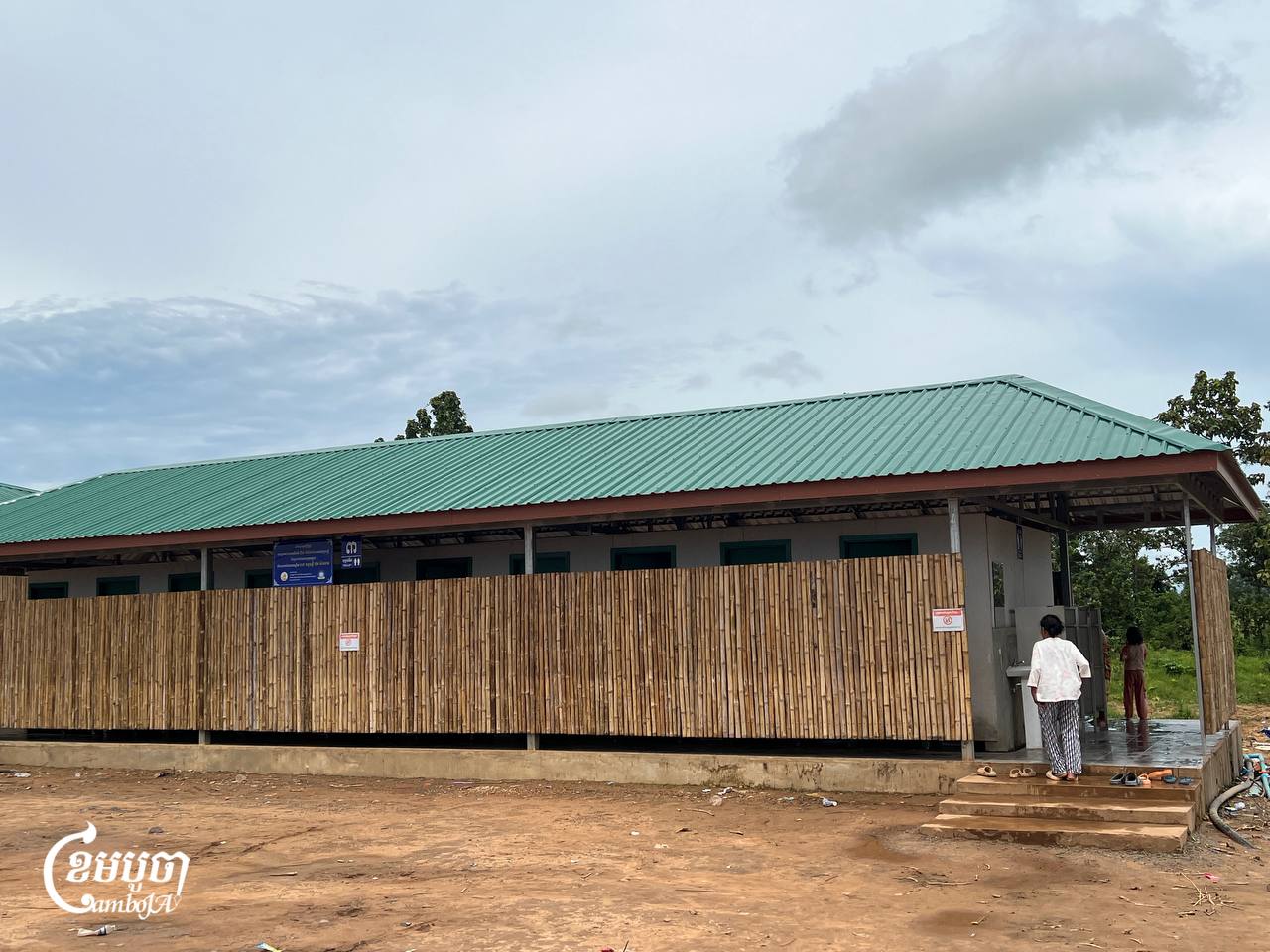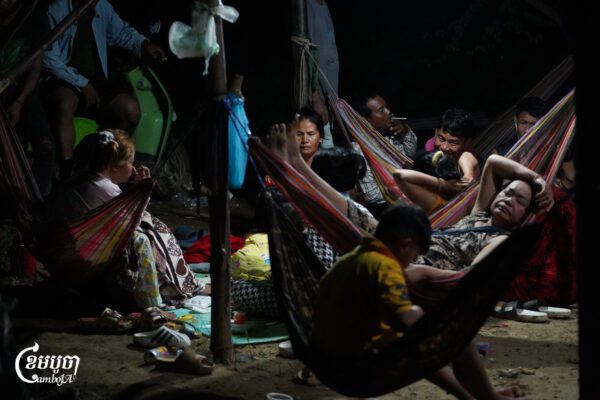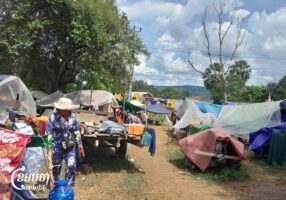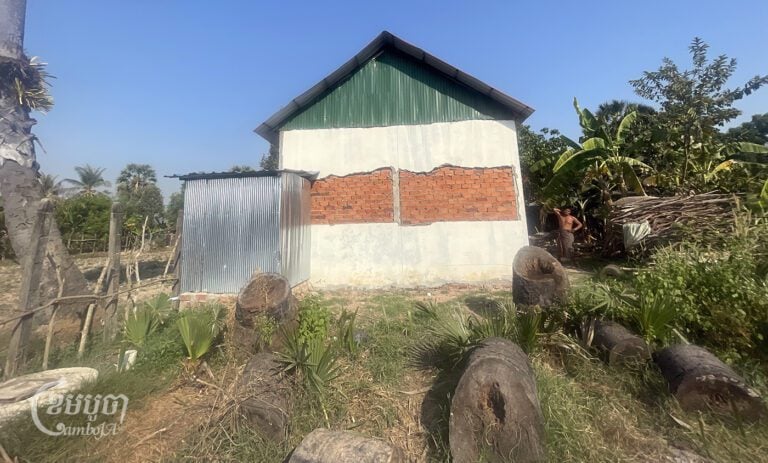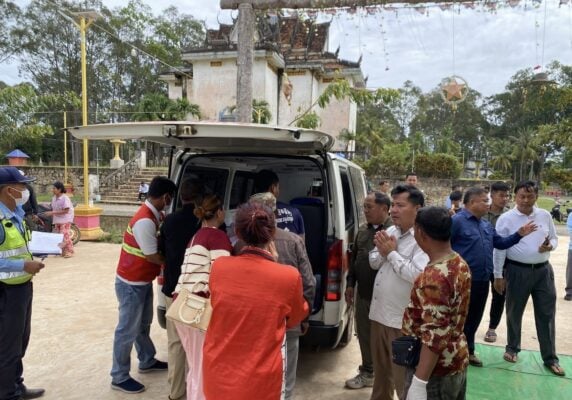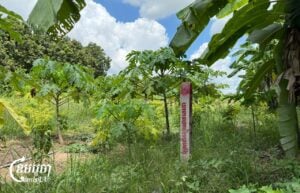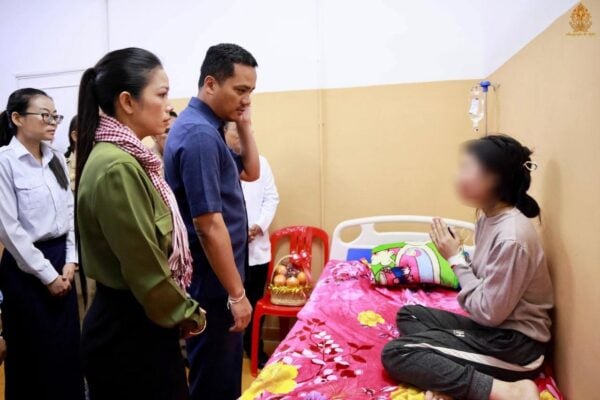Preah Vihear Province: Often to take baths before dusk, a young girl instead sat quietly in her tent when the time came for her to shower. When her mother insisted that she and her sisters do it before the sky became dark, the girl started to cry.
The mother, exhausted from volunteer work in the camp, wondered what was going on with her tearful daughter.
“Despite scolding her and her sisters, they wouldn’t go. They simply sat and cried, without saying a word.”
Sophy, 43, (her real name was changed to protect her identity) started to notice something unusual in her daughters and also her niece sometime after they moved to a shelter in Preah Vihear province on July 24.
After a phone call with her husband about the girls’ behaviour, Sophy decided to follow them to the bath area, and learned that they were being harassed by men.
“I secretly followed them and saw that several men, whether they had wives, would watch my children bathing in their sarongs. They would also take off their clothes and underpants and bathe close to my children. Now I know why my children refused to bathe,” she said, admitting that she overlooked the matter in the beginning.
From an investigation conducted in early September, the reporters spoke to four young women and girls, aged 14 to 21, and their guardians at the 5,000 Bodhi Trees Pagoda shelter in Kulen district, Preah Vihear province.
All the interviewees recounted their experience of being sexually harassed, and subjected to a lack of safe spaces, and poor hygiene at the camp.
According to UNFPA, sexual harassment depicted any unwelcome conduct of a sexual nature that might reasonably be expected or be perceived to cause offense or humiliation. Sexual harassment may involve any conduct of a verbal, nonverbal or physical nature, including written and electronic communications, and may occur between persons of the same or different genders.
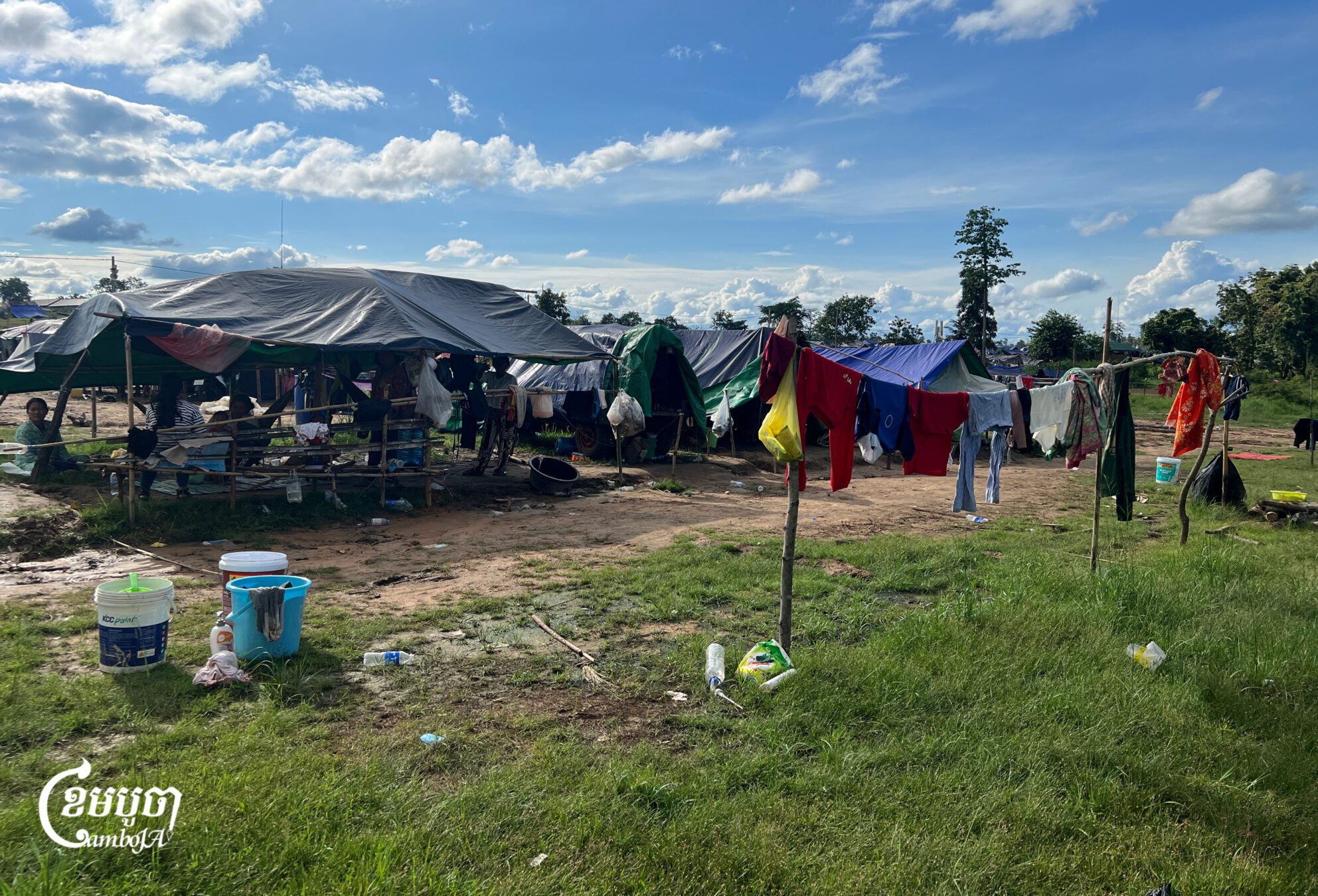
Root cause
When the border conflict broke out between Cambodia and Thailand on July 24, thousands of villagers from Oddar Meanchey and Preah Vihear provinces temporarily moved to shelters.
The provincial deputy governor said there were 15 displaced camps in Preah Vihear which accommodated at least 12,000 families or over 40,000 people—more than half of them women—prior to the ceasefire agreement.
Located approximately 100 kilometres from the Thai border, the 5,000 Bodhi Trees Pagoda in Kulen district is the largest displacement camp in the province, as it could accommodate over 6,000 displaced families, equivalent to over 20,000 people. The camp was opened on June 8, 2025 after an initial confrontation in May left one Cambodian soldier dead.
At the height of the July conflict, the provincial administration built an additional 140 toilets to serve the displaced people, bringing the total to 220 toilets to serve the needs of 50,000 people.
Based on observations, one block of toilets measured about five meters by 20 meters, each containing 10 cubicles and a row of unisex bathrooms. The units had openings at the top and bottom of the door, with one water pipe connecting them.
Sharing her traumatic experience, Sophy’s 15-year-old daughter, Pisey (her real name was changed to protect her identity), said she was harassed by a group of boys in a bathroom, which was about 100 metres from her tent.
She started experiencing it soon after she and her family moved to the shelter. At the time, the block of toilets was not fully constructed, so there were no bamboo fences to ensure people’s safety, although electricity was already connected.
Pisey said she was afraid of being watched every time she went to the water closet because there were no doors. She was also shy to take a shower as the bathrooms were shared by men and women, who always looked at her.
“When I washed my body, they [men] would look at me. They would also bathe next to me, and only wear shorts [underpants] when they do that. I felt scared and uncomfortable.”
Sometimes she would wait for half an hour before deciding to go to the toilet, as she was afraid of someone peeping.
Pisey said one evening when she and her sisters were showering, someone turned off the light. Suddenly, a teenage boy who bathed close to her came and touched her body, which made her feel scared and worried that he might do other things to her.
“This feeling will probably stay with me forever because I keep picturing it over and over again. At night, I don’t want to shower. Sometimes I’d rather not bathe, instead wait till morning so that my brother can accompany me. Only then will I dare to go. At times, I bathe with my clothes on.”
Following the ceasefire agreement late night of July 28 and August 7, authorities allowed displaced people to return home. As of September 12, there were 1,800 families or 6,300 people remaining in the 5,000 Bodhi Trees Pagoda displacement camp.
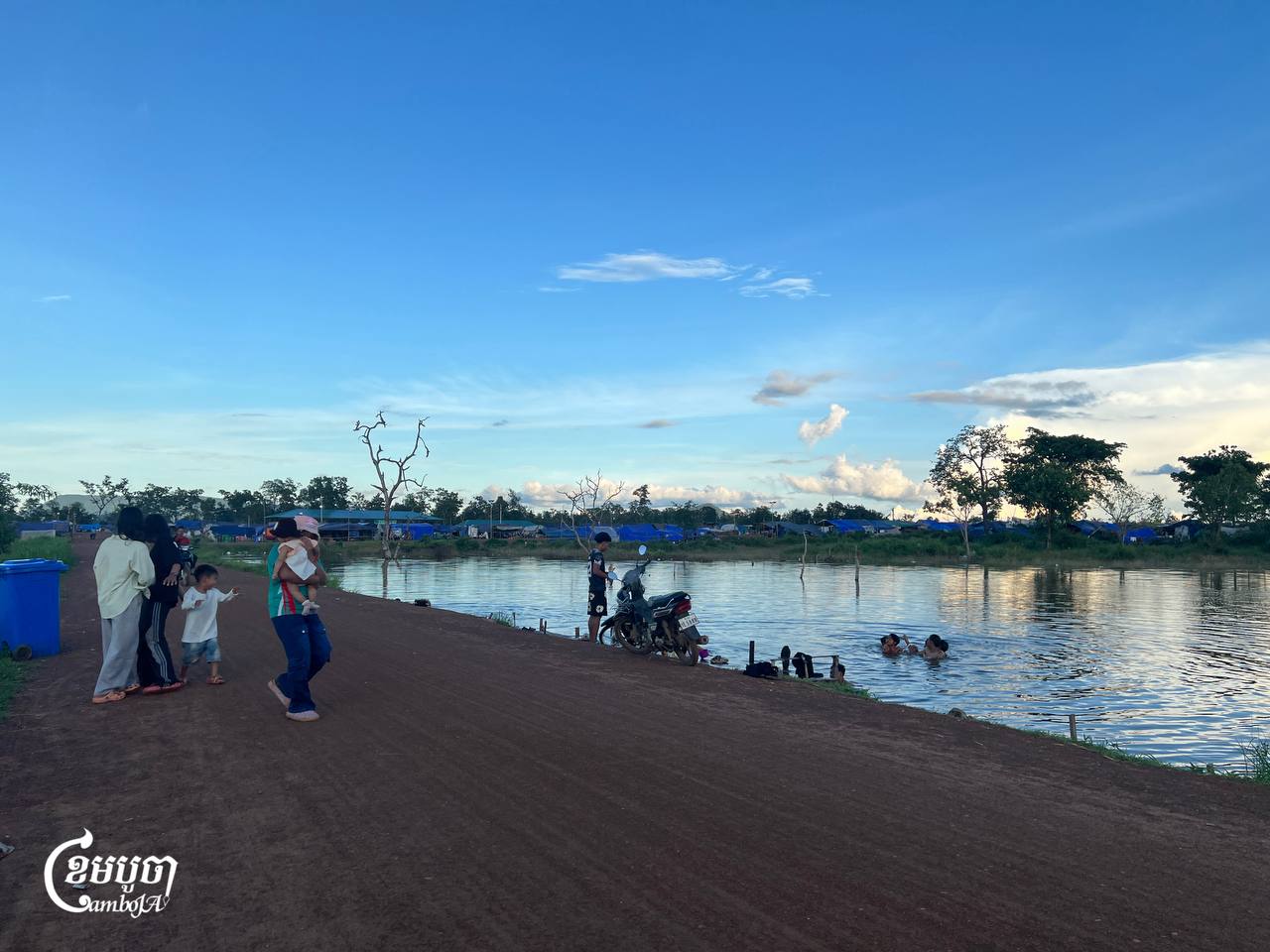
Pisey’s mother, Sophy, said sexual harassment continues to occur, although many people have returned home. “But the number of cases is not as high as it used to be.”
She said most of the incidents involved boys over 10 years old, who knock on the door and watch girls go into the bathroom. The boys like to stand close to girls, including her daughters.
“Mostly, they’re boys from 10 to 15 years of age, but not many from those over 16. These boys try to look from the bottom of the door. Sometimes when girls are waiting to shower, they will come and tap the girls.
“When my daughters are standing, they will come and stand close to them. When I tell them off, they say, ‘Auntie, don’t be so old-fashioned, now is the modern age’.”
She said her daughters also complained about sharing the bathrooms with men, and were annoyed that they kept looking at them.
After learning about the incident, Sophy constantly monitored the situation, and allowed them to bathe in a nearby pond instead. Sophy also asked her nephew to look after her daughters.
“They were worried and stressed, sometimes they didn’t want to take a bath or ask me to bring them to the pond instead, because they said it was easier than a shared bathing place.
“In the bathroom, if my daughters changed their clothes, there would be a lot of eyes on them,” said the 43-year-old mother.
She opined that parents’ lack of attention on their daughters when they bathed alone was bad as the girls get scolded by the boys’ parents instead.
“The problem is due to the parents not paying attention to the girls. Sometimes when their daughters are bathing, the boys will turn off the light and hug them from behind. But the boys’ parents instead blame the girls for not being careful, or wanting to seduce their sons, even though the girls didn’t know what happened.”
‘They call me sweetie’
Kol and his wife, who are guardians of their 14-year-old granddaughter, said the latter was not harassed as they always kept a close watch on her. They worry about her safety, as there are people from different places and backgrounds living in the shelter.
“Although we are all Khmer, we cannot read other people’s intentions. I’m very worried about that because there are people who are bad, steal, rob, and harass others. They do it so crudely, and if we don’t pay attention, it may affect us later,” said the 71-year-old man.
Another teenager, Rachana, using a pseudonym, said she was subjected to sexual harassment several times by boys and men at the displacement camp. She said she once saw a boy secretly taking pictures of her while she was in the toilet.
“A teenage boy came into the toilet next to me and put his hand through an opening, where the tap was, with his phone. But he ran away after I saw it. I didn’t see his face, but I know he is 17 or 18 years old.”
Rachana, 17, told her mother and relatives about this incident, but they did not believe her, saying she was lying and careless. The denial left her disappointed, and she walked away in tears. “I was scared that he would take a picture [of me] and post it.”
Rachana was also afraid of children knocking on the door or watching her enter the bathroom to change.
She added that some older men would stare at her and try to come near her while she was taking a shower or washing clothes. It made her even more afraid; sometimes she did not dare take a shower.
“Most of them are old. As there is no cover in the bathroom, they watch me. Even when I wash clothes, they don’t go anywhere; they just sit there and watch. Some men, in their 60s, who have wives and children, make gestures and look at me up and down when I’m in a sarong.”
Rachana has heard from other women and girls of similar experiences. They advised her to be careful. Even her disabled sister went through the same, which caused her to panic and fall ill. And now she is scared to take a bath or wash clothes alone.
Kanika,16, whose name was changed to protect her identity, described her experience of being watched by a middle-aged man near her tent. She said whenever she and her friend change their clothes in the tent, the man, who sleeps in a hammock, would look their way.
“We don’t dare change our clothes there. We had to find another place to change, but it was miserable looking for a place to change every time.”
Not only that, she said, when she and her friend go to the toilet, the man would look at their reflection on the tiles. She told her friend about this when she noticed him doing it. Now, they take turns covering the opening at the bottom of the door.
She has felt uncomfortable ever since she experienced this.
“It affects us because we are afraid of what he will see. We always have to be careful.” It has left them feeling scared all the time of him “secretly recording” them and posting the video. “As a girl, if these things happen, our life would be ruined.”
Kanika told her mother about the incident and was told that she will inform authorities.
She also encountered a perverted man who was doing “something”, and a group of boys who made a comment about her face when she walked alone. She felt that some children under the age of 10, who probably did not have such “bad behaviour” previously, have adopted it after seeing adults do it.
Kanika shared that the border conflict has affected her mental health compounded by the sexual harassment. “I want to go home as soon as possible because I don’t face such a problem there.”
A young mother, Leakhena,21, whose name was changed to protect her identity, said a group of gang boys flirted with her when she walked to the water closet alone.
“They called me sweety, and I told them I was already married. But they didn’t seem to believe it, hence why I’m worried that they would keep following and trying to be friendly to me. They ask over and over again […] I’m afraid that at some point when I’m alone, they will do something bad.”
According to her and the others, authorities have been monitoring the situation, but due to the large number of displaced people it makes it difficult for them to control.
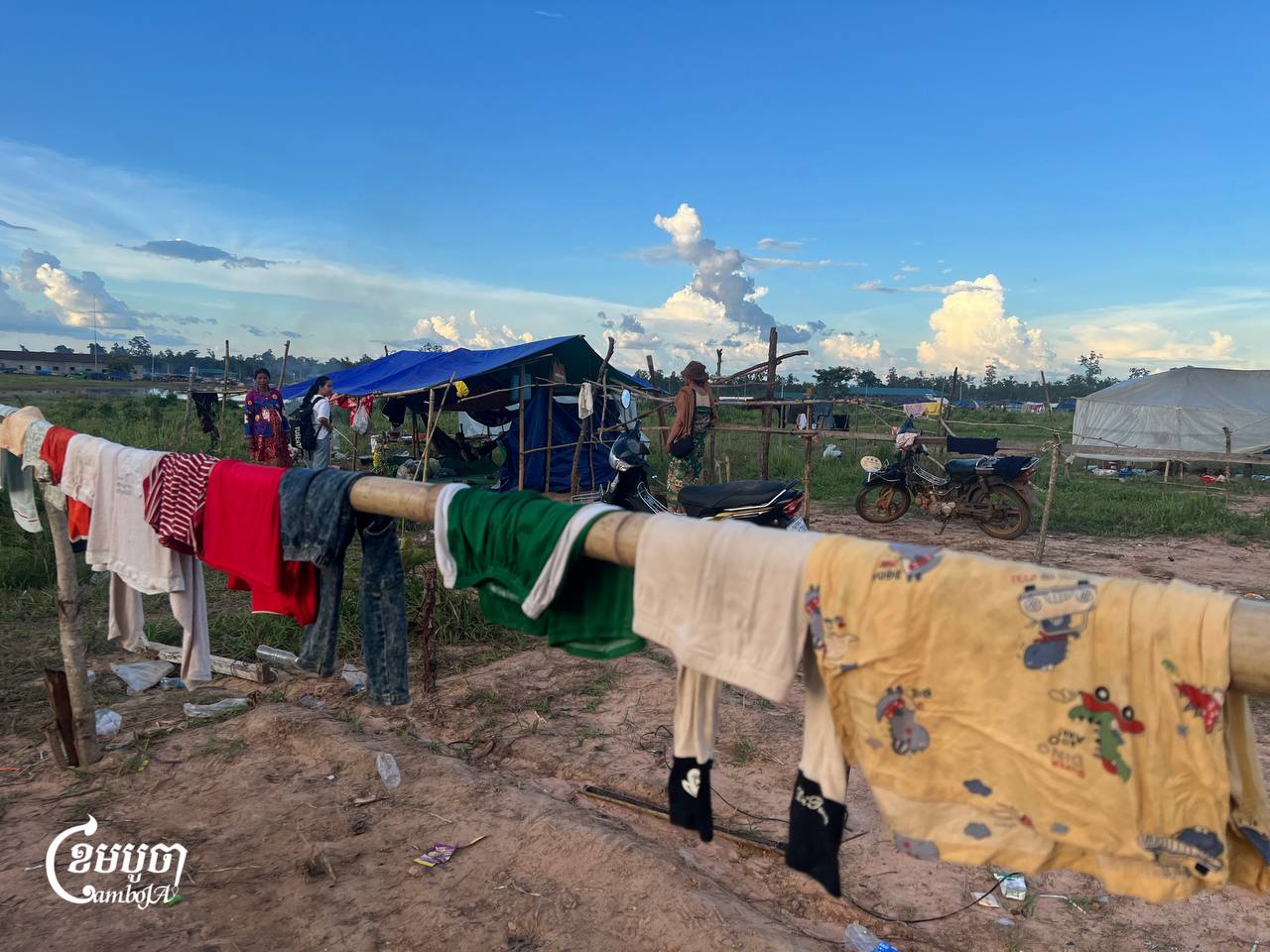
Pushed to suicide
Nop Vuthy, deputy governor of Preah Vihear province and head of the 5,000 Bodhi Trees Pagoda displacement camp, contended there were incidents of girls being watched in the bathroom in the beginning. One incident led to violence as the boyfriend of a woman fought with a man who was peeping at her.
However, he said, only two or three cases were reported because the authorities took action and put up more bamboo fences to prevent such problems.
“There were cases where they [boys] watched the girls who went to the bathroom. When the boys saw a girl or woman they fancy going to the bathroom, they would follow and stand on the water tank to peep. There was also an argument or fight after one of them was caught peeping at his girlfriend.”
“[But] our police usually solve the cases. His excellency, the governor, [instructed] that bamboo [fences] cover the bathroom.”
He said there are “no problems anymore” after the authorities “educated” some of the young men who watched the girls in the bathroom.
“Now it seems that there are no such problems. We still have a mechanism to educate them not to do that again,” Vuthy said, adding that the act by the men and teenagers was “not good, it’s immoral”.
Phorn Chanveasna, a psychologist with the Transcultural Psychosocial Organization (TPO Cambodia), observed that provincial authorities have put precautions, including building bamboo fences to prevent women and girls from being watched while bathing. However, she said, because the bathrooms are shared, sexual harassment continues.
“It is not yet safe because the bathing areas are not separate for men and women. They have to bathe in the same place, so they can still see each other. Therefore, the problem of direct and indirect harassment exists.”
TPO hopes to see authorities pay more attention to women and girls to ensure their safety and stop abuse, she said. To prevent abuses, TPO has educated displaced people, especially girls and women, about confidential reporting regarding abuse, especially sexual abuse or harassment.
TPO also educated girls and young children to be careful when bathing and that they should bring a towel with them. In addition, the unit advises children to bathe with clothes on.
According to Chanveasna, sexual abuse would have a long-lasting effect on victims as the memory is deeply embedded in their minds. It would affect their relationship with their partners and friends, have difficulty socializing and concentrating, loss of confidence, lack of interest in studying, sleep disruption, and many other issue that could lead to suicide if not addressed.
“If victims do not receive professional treatment or psychological support, and are surrounded by friends and relatives who do not understand them, they may feel hopeless or attempt suicide.”
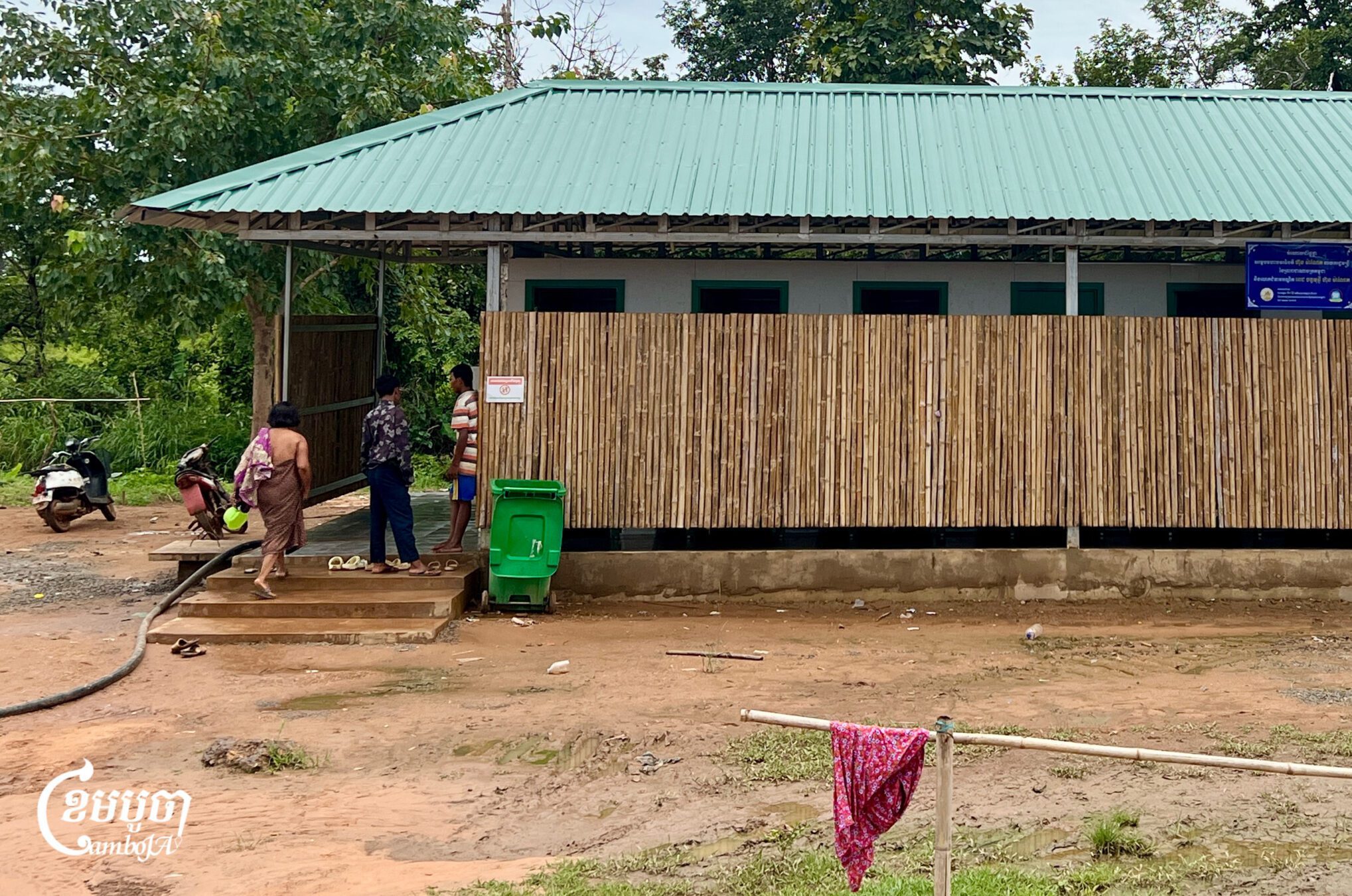
Sitting in the middle of a field
Deputy director of the Preah Vihear Provincial Department of Women’s Affairs Phorn Keophon said they provide education and guidance to the women and girls in the shelter about twice a month. This includes education on healthcare, nutrition and hygiene, and advising them to report domestic violence to the department.
She claimed that “so far there have been no reports of sexual harassment and abuse at any of the displacement camps in Preah Vihear”.
If there were, she urged them to report directly to the department or through their hotline number which has been frequently shared at the displacement camp, in case they are afraid to report it in person.
“We have [emergency] services to let them [victims] contact us. If they have a problem, they can come to the department or call us, and we will meet and provide health or legal consultations.”
Klahaan executive director Mao Map observed that women and young girls are at high risk of harassment in shelters.
“From what we see, there is a high risk of women and girls being vulnerable to harassment and exploitation because of the conditions there. The place is cramped, they live in tents and there is no safe space—a situation which criminals can take advantage of.”
Map also highlighted sexual health challenges for women and girls as a result of limited water and hygiene products, poor sanitation, and only a few toilets.
Meanwhile, Sophy, the mother of three daughters, said only some people cared about hygiene, but most were “completely oblivious” despite advice from doctors and related organizations.
She reminds her daughters to use soap during shower and after defecating, as good hygiene practices are the best way to prevent them from falling sick.
She claimed that her sister-in-law died of cervical cancer at the age of 18, which she believed was due to “poor hygiene”. At the time, her mother-in-law used cloth instead of sanitary pads and did not have access to clean water.
“I always tell my children that when they shower or use the toilet, they must use soap and clean water because many people use this place, so there are a lot of germs. They need to wash their hands with soap and water before leaving.”
Yon Chanmara, a midwife at Sen Chey Health Centre in Preah Vihear province and a nurse at 5,000 Bodhi Trees Pagoda displacement camp, said that sharing bathrooms poses a serious challenge for women, as they are not cleaned frequently. This can cause genital infections and become serious if not treated in time.
She said around 10 women aged 25 to 40 see her every month for gynaecological problems, offering them medication and advice. However, she said that this is only a first-line treatment.
“Because they share bathrooms, women, children and the elderly are most vulnerable. It would be a little better if there were separate bathrooms.”
Back at the camp, Pisey said, “We want to feel safer. We want separate bathrooms and they should be covered. We also want them to be clean.
“Presently, we don’t feel safe. It’s like sitting in the middle of a field. Only our body is covered, but we are surrounded by fields.”


